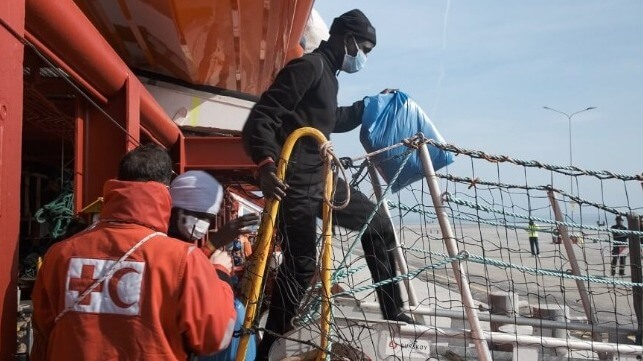Italy's Parliament Approves Measures to Restrict NGO Rescue Vessels

As Europe resorts to desperate measures to contain a growing immigration crisis, the UN has condemned a move by Italy to enact stringent laws against NGOs and humanitarian groups involved in search and rescue (SAR) missions in the central Mediterranean.
Italy has moved to impose stricter conditions on humanitarian organizations that rescue migrants who continue to risk their lives to cross the Mediterranean to Europe. This week, the Italian Chamber of Deputies passed a decree that outlines tough requirements for SAR organizations, and the measure includes stiff penalties.
The decree was created by the right-wing government of Prime Minister Giorgia Meloni, who claims that maritime migration is an urgent crisis for Italy. The proposed regulation requires humanitarian rescue ships to head to port immediately after each rescue, foregoing additional rescues even if they are in the vicinity of people in distress. In the past, SAR vessels have carried out multiple rescue operations over a period of several days.
Crews on board the ships must register every person who is planning to ask for international protection, with NGOs that fail to comply with the new rules being subject to administrative sanctions, fines and have their vessel seized.
The proposed law has been condemned by the UN, which has expressed concern that it will hinder the provision of life-saving assistance by SAR organizations in the central Mediterranean, resulting in more deaths at sea.
“We all watch with horror the plight of those crossing the Mediterranean, and the desire to end that suffering is profound. But this is simply the wrong way to address this humanitarian crisis,” said Volker Türk, UN Human Rights Chief.
He added that more people in distress will be made to suffer and more lives risk being lost because timely help will not be available if the law is passed by Italy’s Senate.
“These measures are clearly designed to hinder NGOs undertaking life-saving search and rescue missions in the central Mediterranean. This is part of an effort to ensure that as many people as possible are instead intercepted by Libyan coastguards and returned to Libya where they face arbitrary detention and torture," said Amnesty International’s Migration Researcher, Matteo de Bellis.
At the same time, Italy has designated distant ports of disembarkation for people rescued at sea, requiring days of sailing away from the original rescue site. The long transits have the effect of reducing the number of vessel assets in the rescue zone at any given time, according to NGO operators.
Libya has in recent years emerged as the dominant transit point for migrants from Africa and the Middle East trying to make it to Europe. In 2022, more than 1,450 migrants died in the waters of the central Mediterranean. Since 2014, almost 20,000 migrants are known to have perished on the crossing, accounting for 80 percent of the deaths recorded in the whole Mediterranean Sea.
Under international law, a captain is duty-bound to render immediate assistance to people in distress at sea, noted the UN's Volker Türk. Under the new Italian law, a nearby SAR vessel would be obliged to breach this duty and ignore the distress calls of those at sea, simply by virtue of having already saved others.

that matters most
Get the latest maritime news delivered to your inbox daily.
“By complying with this provision, NGOs’ shipmasters would, in fact, fail to fulfil their rescue duties under international law,” said Dunja Mijatovi?, commissioner for human rights at the NGO umbrella group Council of Europe.
The proposed law also increases the odds of Libyan coast guard interception of migrant vessels, likely resulting in a higher number of migrants returned to Libya's holding facilities.
